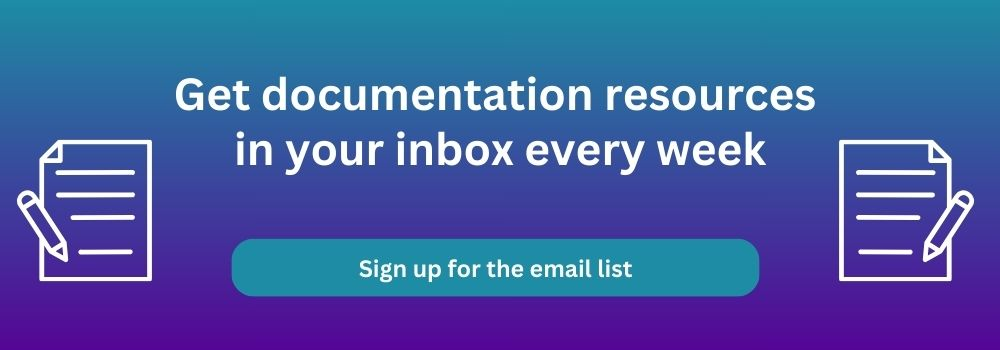Welcome to the wonderful world of documentation!
You likely found this blog while searching for answers about documentation. Maybe a colleague or manager mentioned how you might benefit from documentation, or you're looking for content to teach your team members about it.
One common use of the word 'documentation' refers to technical product documentation, which explains how a company's product (usually software) works. This is customer-facing information that helps reduce a company's customer support ticket, chat, and call times. Most online information is about this type of documentation; even the Merriam-Webster dictionary includes this software type in its definition of documentation.
Though that type of documentation can be helpful for internal employees as well as customers, this blog is about business process documentation.
Business process documentation is focused on helping a company's employees by providing instructions and information about how the business operates.
What is documentation?
Documentation is recording who, what, where, when, why, and how to do everything in your company or your role, and storing that information in one place where other people can find it and use it.
The storing and organizing part is often called knowledge management, if you’re feeling fancy.
Basically, documentation is information that is not only located in someone’s head. If you need to have a meeting in order to get access to the information, then that is a sign the information is not documented.
The word process can be intimidating to people outside the world of business operations, and since documentation is beneficial for many different jobs, let’s make the topic easier to understand.
Documentation is content. Helpful content!
Several documentation experts answer: What is documentation?
Kristen Kelly, Director of Agency Operations at Proofpoint Marketing, describes documentation as “materials that describe, explain, or teach a concept, policy, process, or system as it exists today.”
The note about ‘as it exists today’ is important to distinguish documentation (current) from plans (future).
“Documentation is the historical 'why' behind operations systems that allows for easier implementation of future updates,” said Colton Slauson, Sr. Marketing Operations Manager at Sendoso.
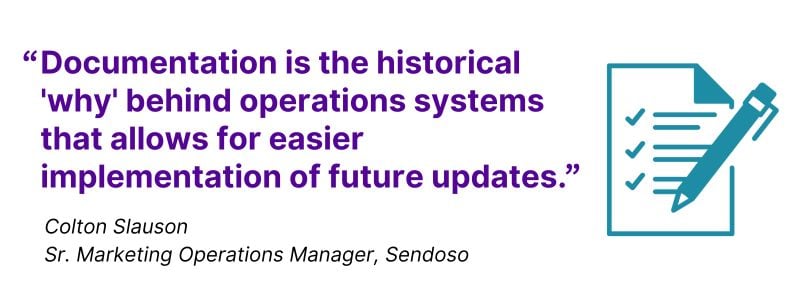
Note that time is also highlighted in Colton's definition, describing how the past historical context makes future updates easier. And in case you haven't stumbled upon any other documentation systems articles, a system does not mean just your tools or tech stack, which is a common misunderstanding. A system includes people, processes, and more.
Tanya Schroeder, Operations & Project Consultant at Huntress Digital Solutions, also emphasizes the time element when she explains that documentation is “a detailed, written, living (not hella outdated) piece of information to explain how something functions or needs to be done.”
A few knowledge and communication companies explain what documentation means
Slack explains documentation as “the act of capturing or documenting all of the steps in a particular task. Ideally, it should happen in real time." There is the time element again! Real-time, in this case, means the act of writing or updating the documentation at the same time as you are building, improving, or updating a process. Slack is an asynchronous messaging tool, and asychronous work is especially enabled by having documentation to refer to, as opposed to defaulting to asking people questions in real-time.
Nuclino, a knowledge base tool for storing and organizing documentation, uses a common recipe analogy to describe documentation. “Think of process documentation as your team's cookbook. Recipes are written down because they’re the easiest way to duplicate a tested process. Similarly, any task that is done more than once or completed by multiple people needs to be documented.”
Lucidchart, a process mapping tool, explains that "a process document outlines the steps necessary to complete a task or process. It is an internal, ongoing documentation of the process while it is occurring..."
What are other words for documentation?
- Standard operating procedures (SOPs)
- Playbooks
- Business manual
- Training manual
- Business handbook
- Employee handbook
- Process library
- Instructions
- Workflows
- Wikis
- Go-By
As you can see by the list above, one reason that it is hard to find helpful resources about process documentation is that it has so many different names. It may be difficult to choose the right words to use in your search.
Colton Slauson mentioned process design, which results in documentation, and process mapping, an excellent type of documentation. These are great words to search for when looking for additional content to help in your documentation efforts.
Tanya Schroeder’s alternate words for documentation showcase the power of adding humor and culture into a topic (documentation) that many people find less-than-exciting: “Get Wikified,” and, “The House In Order.” If your company enjoys adding creative names to the types of work it performs, these are excellent options.
![]()
On that note about humor, adding documentation-related emojis to your Slack or other communication could help make documenting more enjoyable! Meet the party document, above. Use it in place of the party parrot emoji.
What are some examples of documentation?
- GitLab Handbook. GitLab is probably the most famous example of documentation that is publicly shared. It provides transparency and accountability for their own team, while helping other people recreate the processes and work they've built without needing to start from scratch. The Harvard Business Review wrote a fascinating article about the company (a subscription may be required).
- How Notion Marketing Uses Notion. Notion is another documentation-related tool company. Seeing how they do their own internal documentation is intriguing.
- Open Org Employee Handbook. This is a helpful Notion template you can copy and apply to your company's documentation organizing efforts. Even if you don't use Notion, you could get inspiration for categories to use, types of documentation to create, and more.
- The Marketing Operations Playbook Template from MarketingOps.com. This paid resource is meant to serve as the company’s official document on the processes, procedures, and tools for handling all the people that move through the marketing and sales funnel.
For a few examples of which processes to document, this slide about naming conventions may be helpful. Though we're not talking about naming here, the names give you an idea of the topic of each article or document.
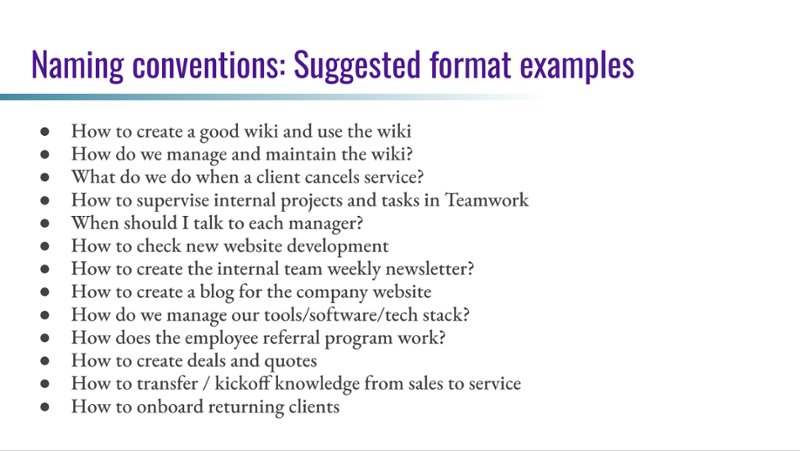
If you have found more public examples of process documentation, I would love to add them here and to my resources page!
Why is documentation important?
What are the benefits of documentation?
"Without documentation, you're relying on tribal knowledge or whatever version of the truth exists in someone's head. A knowledge base provides consistency, clarity, and efficiency in day-to-day operations," said Kristen Kelly.
Kristen explained how documentation has helped her agency, "Our knowledge base facilitates our remote, asynchronous workflow, enabling teammates across the country to access information and instruction anytime they need it. Documentation has also improved deliverable and profitability consistency."
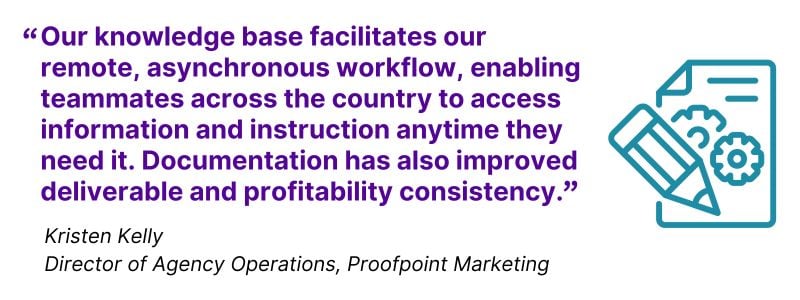
Colton Slauson explained the importance and benefits of the historical context that documentation provides. "Documentation provides historical insight into why certain decisions were made that isn't always identifiable if you're solely looking at the built process. It also helps in determining what other systems and processes are related."
Tanya Schroeder described the cultural benefits of documentation, which turn into measurable business benefits. "It establishes clarity and cohesion within teams, resulting in reduced stress and improved efficiency. This translates to better work for clients and better all-around work culture."
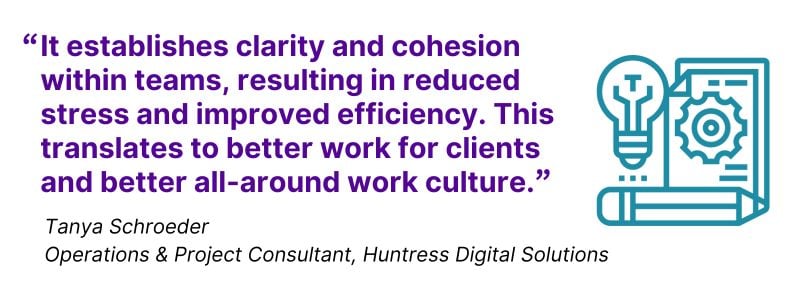
For more of the mental health benefits that documentation can provide, see this post from World Mental Health Day.
Marliese Bartz, Principal at Bartz Consulting LLC, said, "Documenting your processes helps your company move from relying on "campfire knowledge" to having a repeatable guide for current and future employees."
She added a few additional benefits of documentation: avoiding rework, improving worker effectiveness, and standardization.
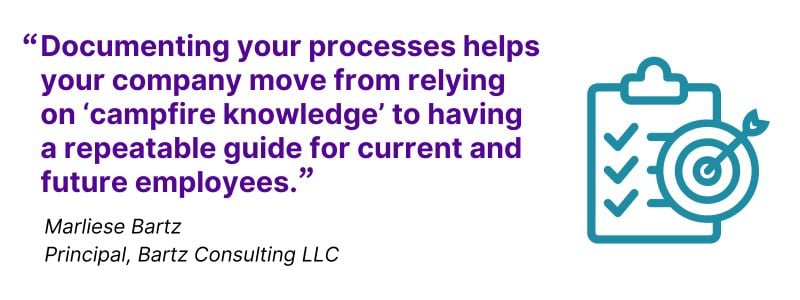
Why is documentation important, for different jobs?
Below are a few of the reasons for people in various roles to create documentation.
- You want to be able to take time off without stress and work fewer weekly hours.
- You don't want to worry about missing any steps in the process or making any errors.
- You are tired of being tactical and reactive instead of strategic and proactive. You want to make time for the work that is going to achieve your goals and earn a promotion instead of fire-fighting every day.
- You are wearing too many hats and want to save your brain power for that valuable building and improving work, instead of using that brain power for remembering how to complete repetitive processes.
Some of documentation's benefits for department managers or a company's first hire include:
- You want to be able to train and onboard your team faster, helping them feel more confident sooner.
- You want to help your team complete processes efficiently, effectively, and consistently.
- You want people to stop creating everything from scratch and recreating the wheel each time they repeat an existing process.
- You don't have time to answer everyone's questions in real time, especially the same questions over and over. Your time is better spent on more focused work that will help you meet your goals faster and promote sooner.
Founders and business owners may find documentation important for reasons such as:
- You want to ensure that crucial knowledge does not leave the company when team members leave, to eliminate knowledge gaps and knowledge silos.
- You want to delegate and easily train your team to efficiently and reliably take over your work, reducing your workload and allowing you to take vacations and other time away from work.
- You want your company to be more profitable by saving time completing work correctly the first time.
- You want to accurately forecast the resources needed and potential revenue, which is only predictable if you have repeatable, successful processes.
- You want to improve your company culture through greater transparency in how the business operates, resulting in more employee retention and attracting better talent.
- You are looking to sell your company or raise funding.
For more information about the benefits of process documentation, First Round Review shared an in-depth article on investing in internal documentation for startups.
When should you start documentation?
Today! You should start documentation as soon as you identify a process or task that you’ve repeated.
This is similar to the proverb about when you should plant a tree: "The best time to plant a tree was 20 years ago. The second best time is now."
The longer you wait to start documenting your processes, the harder it will be to start and build the habits and culture of consistently using, creating, and updating documentation. That means that the longer you wait to start, the longer it will take to experience the benefits of documentation previously mentioned.
Keep in mind that there will always be changes to processes and changes to documentation, so don’t wait until things are 'done' changing in your company. That day will never arrive, unless the company closes! Get used to making updates. Create an efficient change and review process and get the bugs worked out before you’re too deep into documentation debt.
If you are in documentation debt, start now. To help overcome the overwhelm, remember that having something is better than having nothing!
A few specific ideas of when to start documentation:
- Starting when you first design and test a process
- Starting when you improve or fix a process
- Starting when you finish a process or finish a new big project or new type of work
Contributing experts explain the ideal time to start documentation:
"It should be part of your planning process. It doesn't need to look pretty. Something is better than nothing. When you're done, if time permits, revisit and clean it up," Colton Slauson said. This is great advice if you're overwhelmed and suffer from perfectionism -- 'living' process documentation is always being improved, so it will never be perfect.
Tanya Schroeder echoes the 'plant a tree' proverb above: "Day 0. If you haven't, start NOW!"
Kristen Kelly emphasized the repeatability of the process. "It's ideal to document a process after it has been tested a few times, and has become optimized and repeatable," she said. This is a great point to make sure you're documenting something you know will repeat, especially if you're just starting your documentation journey.
If you need help prioritizing where to start documenting, this free resource could help.
Who is responsible for documentation?
If your company has a RevOps (revenue operations) team, they are a great option to help you begin to organize your documentation efforts.
Any operations team will often have people who are particularly interested in the benefits of documentation, but ideally, all teams should own their department's documentation. Managers should hold their teams accountable for creating, using, and updating documentation, as well as giving people time to complete this documentation work.
An operations team can help make this dream a reality by creating and rolling out systems to enable documentation that divide up the work among many roles and responsibilities.
Thanks so much to the expert contributors for this article: Colton, Kristen, Marliese, and Tanya!
If you’d like to contribute to future articles, sign up for the mailing list below!
If you enjoyed this blog, see the next blog in the contributor series about "Why is documentation important?"
Find a comprehensive guide to learn how to document you business processes here.
Topics: Documentation



